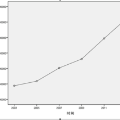Machine learning (ML) based time series forecasting models often require and assume certain degrees of stationarity in the data when producing forecasts. However, in many real-world situations, the data distributions are not stationary and they can change over time while reducing the accuracy of the forecasting models, which in the ML literature is known as concept drift. Handling concept drift in forecasting is essential for many ML methods in use nowadays, however, the prior work only proposes methods to handle concept drift in the classification domain. To fill this gap, we explore concept drift handling methods in particular for Global Forecasting Models (GFM) which recently have gained popularity in the forecasting domain. We propose two new concept drift handling methods, namely: Error Contribution Weighting (ECW) and Gradient Descent Weighting (GDW), based on a continuous adaptive weighting concept. These methods use two forecasting models which are separately trained with the most recent series and all series, and finally, the weighted average of the forecasts provided by the two models are considered as the final forecasts. Using LightGBM as the underlying base learner, in our evaluation on three simulated datasets, the proposed models achieve significantly higher accuracy than a set of statistical benchmarks and LightGBM baselines across four evaluation metrics.
翻译:基于机器学习(ML)的时间序列预测模型在产生预测时通常需要和假定数据具有某种程度的平稳性。然而,在许多实际情况下,数据分布是不稳定的,而且随着时间的推移而改变,从而降低了预测模型的准确性。在ML文献中,这被称为概念漂移。处理预测中的概念漂移对于当今许多ML方法来说是必不可少的,然而,先前的工作仅提出了在分类领域处理概念漂移的方法。为了填补这一空白,我们研究了特别是在全球预测模型(GFM)中处理概念漂移的方法,这种模型最近在预测领域中变得流行。我们提出了两种新的概念漂移处理方法,即误差贡献加权(ECW)和梯度下降加权(GDW),基于一个连续自适应加权概念。这些方法使用两个预测模型,分别使用最新系列和所有系列进行训练,最终,由两个模型提供的预测的加权平均值被视为最终预测。使用LightGBM作为基础学习者,在我们对三个模拟数据集的评估中,所提出的模型在四个评估指标上实现了比一组统计基准和LightGBM基线更高的准确性。

